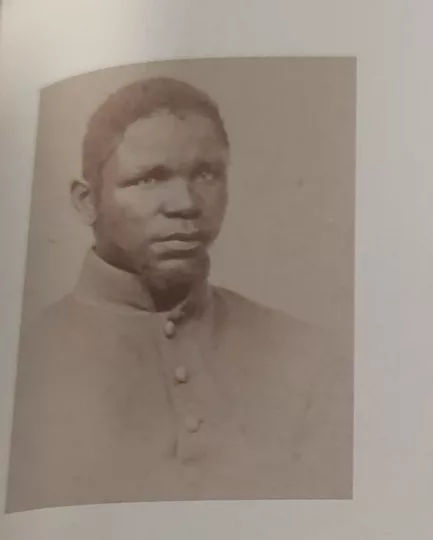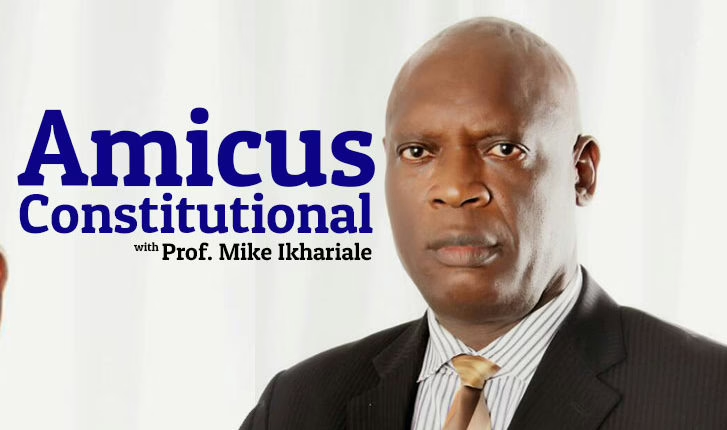Nicholas Said’s Encounters with American Racism
Nicholas Said
Published By: Kazeem Ugbodaga
By Farooq A. Kperogi
This column continues from last week. Isaac Jacob Rochussen, the patrician from the Netherlands who brought Nicholas Said to New York in January 1860, exposed him to his first baptism of American racism.
At an abolitionist church in New York, Rochussen was told that he couldn’t sit in the same row of seats as Said. Like all Black people in white-dominated churches, Said had to sit in the balcony of the church. Rochussen was so exasperated that he and Said left the church in a huff.
After taking Said on a voyage to Haiti (where the mixed-race freemen in charge of the government there treated Said like a subhuman because of his pitch-dark complexion and Kanuri facial marks), Rochussen was broke and returned to New York.
It turned out that Rochussen was a scammer. He left Said at their expensive hotel in New York. After three months of waiting, the hotel management handed Said a bill equivalent to $40,500. Since he couldn’t pay it, his luggage was confiscated.
“I lost all my clothing, consisting of four Turkish costumes, three full suits of broadcloth, a dozen linen and fine English flannel shirts, etc. etc. with more than $250 [worth $7,200 now],” Said wrote. “I was almost penniless…. Having no trade, knowing no person to whom I could apply for help—I was truly in a pitiful situation. But God, who never forsakes us, came to my relief.”
That relief was a $10 loan he got from a reverend gentleman he became acquainted with while staying at the hotel. The reverend told him to go to Detroit in the state of Michigan, “where there were a great number of coloured people.”
By the time he got to Detroit, Said had become disillusioned with religion, writing that both Islam and Christianity were “against my feelings and common sense.” Nonetheless, his urge to go back to Borno was rekindled.
He suppressed his disenchantment with religion and, in March 1861, applied to the African Civilization Society, which was looking for educated Black people to go to Africa “to instruct the natives in the arts and sciences” and to evangelise the gospel of Christianity.
In Said’s application, he promised that if he was considered for the job, he planned to go to Borno and “spread the gospel of our Lord and Saviour Jesus Christ.” Dean Calbreath suggested that Said didn’t mean it since he had become frustrated with religion. “But it shows how desperately he wanted to go home,” Calbreath writes.
Said got the job and would have returned to Borno but for the start of the American Civil War on April 13, 1861.
In light of the soul-destroying racism he had faced in the United States and Haiti, he had “prayed earnestly to be enabled to do some good to my race” and vowed that he “would willingly sacrifice my life, if need be, in realising my dreams.”
The outbreak of the Civil War, which was triggered by the desire of Southern whites to enslave Black people in perpetuity, provided such an opportunity.
Nevertheless, when Said rushed to enlist in the US Army to fight in the Civil War, he was told that Black people could not serve in the army. To ensure that no person with even the slightest tincture of African bloodline served in the army, even white men had to have their genitalia inspected because “the skin covering these organs is much darker in persons having a trace of negro blood”!
He took to teaching French to Black people in Detroit and “became quite distinguished, especially among the coloured people, for his erudition, his large experience of the world, and his promising talent,” Calbreath quoted a journalist as having written.
A little later during the war, there was a change of policy. The US Army decided to form all-Black regiments to assist in the fight against Confederate forces determined to keep the institution of slavery. Recruiters from Boston, in the state of Massachusetts, came to Detroit.
- Borno man who fought in America’s Civil War in the 1860s
Said, only three and a half years in America at the time, enlisted. Within just two weeks of enlisting, he was promoted to a sergeant. The colonel who recommended his promotion said Said’s “linguistic ability was very marked” and that he was the scion of “the ruling class of his tribe.”
After his promotion to sergeant, there was a laudatory profile of him in the Boston Evening Transcript, one of Massachusetts’ notable newspapers at the time. Although his last name was misspelled as “Saib,” he was described as an “intelligent-looking negro, perfectly black, modest and gentlemanly in bearing” and that his “acquisitions and behaviour go far to dispel the ignorant and vulgar prejudice against the coloured race.”
The profile turned him into a celebrity in his all-Black regiment, called the Fifty-Fifth.
Unfortunately, the racism that initially stopped the enlistment of Black people didn’t abate even during the war, even among white people who were fighting to stop Black enslavement.
Black soldiers—whether private, corporal, or sergeant (they couldn’t rise above sergeants)—were paid no more than $7 per month. The lowliest white private, by contrast, received $13 per month. White corporals received $17, and white sergeants received $21. “For Sergeant Said, who had been drawn to the United States because of its democratic ideals, this was only his latest disappointment,” Calbreath writes.
(In 1863, $7 had the same purchasing power as approximately $175.34 today.)
Black soldiers protested the scandalous pay disparity. But the white head of their brigade, Colonel James Montgomery, not only chastised them for this but threatened to court-martial and execute them. “You want to be placed on the same footing as white soldiers… [but] you are a race of slaves,” he said. “A few years ago, your fathers worshipped snakes and crocodiles in Africa.”
But the Black soldiers were neither discouraged by the racist putdowns nor did they relent. Said used his gift of “precise penmanship and the ‘literary quality’ of his writing” (1145) to write and edit anonymous newspaper columns to call attention to the racially motivated pay disparity between Black and white soldiers.
Said’s anonymous columns got the Massachusetts governor at the time, John Andrew, to not only lobby the federal government to increase the pay for Black soldiers but also to instruct the state’s paymaster general to take physical cash to the war front to pay the Black soldiers.
But the Black soldiers rejected the state’s money, saying they wanted the federal government, on whose behalf they were fighting, to pay them the same amount that they were paying their white peers.
Said and his colleagues fought for more than a year without pay but continued to protest—at the cost of the lives of some of them—until August 1, 1864, when the federal government decided that Black soldiers would receive equal pay as their white counterparts “and that the pay would be retroactive, covering all the money they were owed since enlisting” (177).
For a long time, Black soldiers were not allowed to fight. They merely did back-breaking menial jobs such as shovelling, bagging, chopping, and hauling instead of fighting the Confederate rebels. During his free time, Said taught Black soldiers.
It was only on July 1, 1864, that Said and members of his platoon had a chance to fight the Rebels in battle. Even so, they “had been given aging rifles that were so faulty they were subsequently sent to the scrap heap” (174), according to Calbreath.
In spite of their disadvantage, Said (who “must have felt that finally he was living up to the destiny his father had left for him, or the dream he had envisioned for himself as a boy, playing war games at the gates of Kukawa,” as Calbreath put it) and his comrades overpowered the Rebel forces, forced them to beat a retreat, and seized their weapons, even though they also suffered casualties.
To be concluded next week.











